In this newsletter: the glyphosate saga, both in the EU and the US, and the European Citizens' Initiative Save the bees and farmers.
We need your help to stop Bayer Monsanto & Co poisoning us and our environment. In 2022 the EU authorisation of glyphosate expires. The Glyphosate Renewal Group – a coalition of producers led by Bayer Monsanto – has asked for a 15-year renewal. In June a commission of 4 EU countries sent their report for the assessment. Conclusion: green light. They see no signs that glyphosate can cause cancer, nor any other issue. There is a huge problem with this system of (not) controlling pesticides. It gives a false sense of security, which was recently exposed in a very clear manner, as the article below shows.
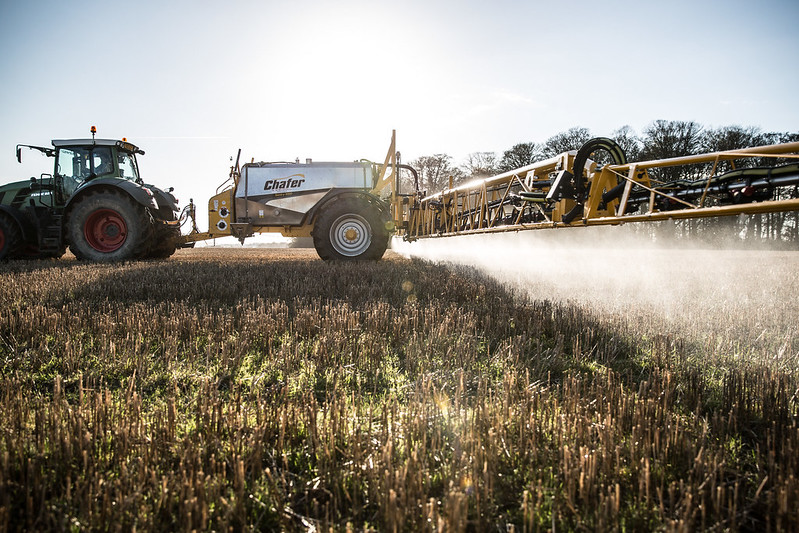
Photo credit: Chafer Machinery
So, are you ready for 15 more years of Roundup spraying?
We are not. Help us to bring an end to the toxic age!
EU citizen? Sign www.savebeesandfarmers.eu as a first step. You might have done that already. If not, please do it now. After you have signed please ask friends and family to do the same. Talk to your contacts, mail them, ask them on social media. Ask organisations to send mailings to their supporters. This is important, only together we can turn the light for pesticides from green to red. We need many more signatures before the end of September. We have to win this battle, for it’s the first step to stop glyphosate and other pesticides.
Stand for the cause. Don’t be afraid to give your personal details. These are not asked by the organisation. It is asked for by the authorities so they can take a sample and control if these votes are valid. It is not meant for registration.
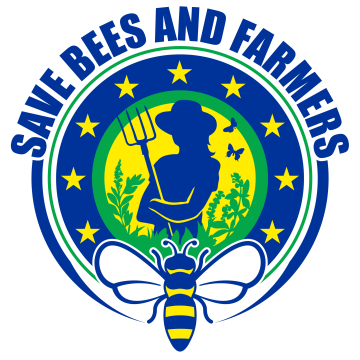
So please sign and spread the word!
Together we can do it.
Not an EU citizen? Please support petitions and actions against pesticides in your country.
The Glyphosate saga – failing control in the EU and the US
To protect health and environment, the authorities have set up a system. Bodies like the European Food Safety Authority (EFSA) in the EU and the Environmental Protection Agency (EPA) in the US take care of our health and the environment. Or... Do they really?
This system is now exposed as not working. Not for the people, not for the planet. For the pesticide producers, it works perfectly. Almost every product is admitted for sale. How does that work? The agencies don’t do their own studies, they rely on studies provided by the industry. Only these studies. That is because EFSA has adopted a proposal by three BASF employees, the Klimisch Score. All studies must comply with criteria set up by the industry. This was meant to prevent fraud (which is good, see below) but at the same time excludes all independent scientific studies.
EU Citizens’ Initiative on Glyphosate Made a Change
Until recently the Industry studies were secret. That changed after the successful EU Citizens Initiative on Glyposate in 2017. In a very short period, 1.3 million Europeans asked to ban glyphosate. It didn’t lead to a ban, but also not to the 15 years permit that was asked for by Monsanto. Glyphosate got a 5-year permit and that’s why we’re discussing it again now. Another important result was that the EU Commission promised transparency in the process. They said they would make the Industry studies available.
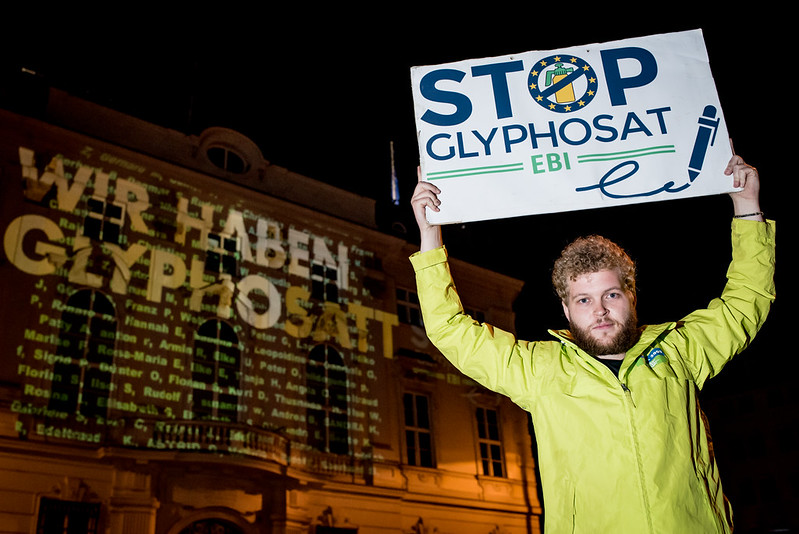
Photo credit: Global 2000/Cristopher Glanzl
Since they didn’t do that fast enough, some Green politicians started a court case and won. In a landmark verdict the EU Court of Justice decided in 2019 that the studies are part of the authorisation and should therefore be made public. The organisation SumOfUs sent in an Access to Documents request and received the studies. They consulted independent experts and what did they find?
Most Studies Used to Allow Glyphosate Are Not Reliable
Finally, independent scientists could have a look at the studies provided by the glyphosate manufacturers. Two experts from the Institute for Cancer Research from the University of Vienna scrutinized the studies with remarkable results. Their analysis shows that out of 53 industry studies, only 2 can be assessed as scientifically ‘reliable’, when using the OECD Guidelines that are used normally for toxicological studies. 34 are ‘not reliable’ and 17 only ‘partly reliable’ to draw conclusions on the question if glyphosate can cause cancer. Moreover, most studies used the wrong methods and not the methods that would show a relation with cancer.
Their conclusion: based on these studies the EFSA could not conclude that glyphosate is not able to cause cancer. There was no basis to contradict the conclusion of the International Institute on Cancer Research (IARC) that glyphosate probably causes cancer.
This is quite explosive information. Products that cause cancer should not be allowed according to the EU regulations. For this means that the EU authorities should have banned glyphosate already in 2017!
And what do the independent scientific studies tell us?
Industry studies are secret, even for most fellow scientists. This is in stark contrast to the way independent scientists work. Before a study is published in a scientific review, it is controlled by fellow experts who are not involved in the study.
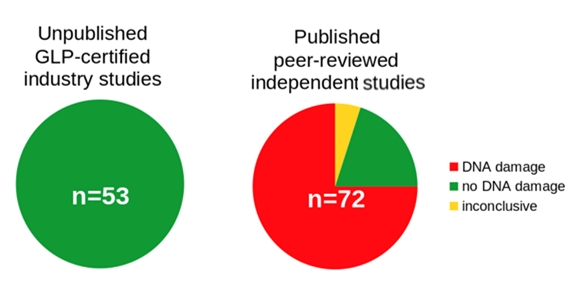
Source: glyphosate study Q&A
In this overview you see 53 studies by the producers of glyphosate. None of them show damage to DNA, which is a strong indication to cause cancer. Compare this to the 72 independent studies, among which three quarters concludes that glyphosate and its formulations cause damage to DNA. So we can conclude that the methods used by the producers and accepted by EFSA don’t detect carcinogens. The claims of the industry are not ‘science-based’, they are based on quicksand.
If you want to know more details on the recent study, read this excellent overview and Q&A by Corporate Europe Observatory together with HEAL, Global2000, Pesticide Action Network PAN and SumOfUs.
For an overview of recent studies and health problems with glyphosate see this overview by US Right to Know.
So, the EU system to ‘control’ pesticides does not work. It creates a false sense of security and allows dangerous chemicals to be sprayed widely. Let’s get rid of these dangerous and unnecessary chemicals. Sign www.savebeesandfarmers.eu and spread the call!
And in the US?
Well … see below
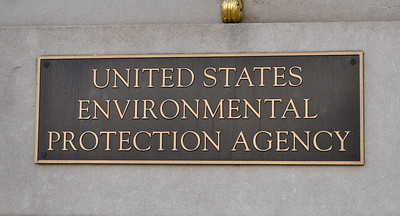
Photo credit: Texasgopvote.com
EPA Manipulating Pesticide Research
Managers and staff in the Environmental Protection Agency’s in the US tampered with the assessments of dozens of chemicals to make them appear safer, according to 4 scientists who work at the agency. This happened in the Office of Chemical Safety and Pollution Prevention.
The whistleblowers’ job was to identify the potential harms posed by new chemicals. They provided journalists from The Intercept with detailed evidence of pressure within the agency to minimize or remove evidence of potential adverse effects of the chemicals. This included neurological effects, birth defects, and cancer.
Together, the evidence they provided shows a pattern in which the EPA failed to follow the law that oversees chemical regulation. One of the whistleblowers says, ‘Like a lot of us who are in this, we came to work at the EPA because I wanted to preserve the environment for our children’s children. It’s infuriating that I have to push back against managers to do that.’
You can read the amazing and disturbing story on the website of the Intercept. Read more here: The Department of Yes – How Pesticide Companies Corrupted the EPA and Poisoned America.
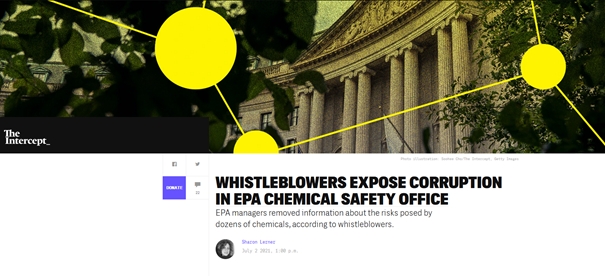
What’s happening in the glyphosate cancer court cases in the US?
Bayer – Monsanto tried to settle the more than 42,000 court cases on Non-Hodgkin Lymphoma (a form of cancer) caused by glyphosate. The company wanted to spend some 10 billion dollars in the settlement. However, by far not all victims agreed. Also, the attempt to stop new cases failed. On May 27th a judge ruled that parts of the plan were ‘clearly unreasonable’.
Following this ruling Bayer announced that they consider to stop selling Roundup products to the public in the US and would only sell it to professional users. The next trial to go ahead is the case of Donnetta Stephens v. Monsanto, set for trial on July 26 in California.
Updates will be published in the Monsanto Roundup & Dicamba Trail Tracker from US Right to Know.
Can you support our work?
Thanks for supporting the case against harmful pesticides and ecocide! You could also help us with a donation. Our work is voluntary but we need money to keep website and social media running and contribute to the campaign against glyphosate. Thank you!


